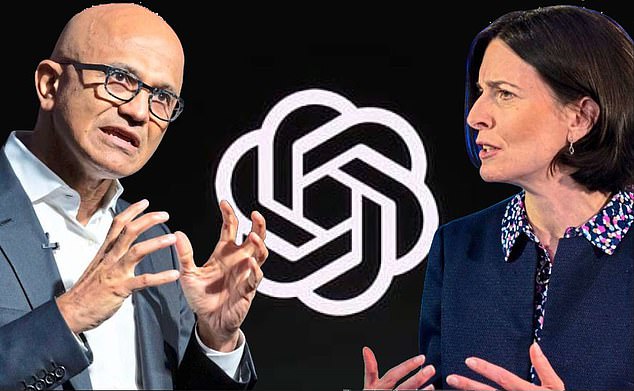- CMA examining relationship and whether it could be considered a merger
- It is the first authority to question the tie-up
- But other regulators around the world are expected to follow the UK’s guide
The competition watchdog is taking on Microsoft again – this time over its partnership with the maker of ChatGP.
In a shock advance, the Competition Markets Authority (CMA) said yesterday it is examining the tech giant’s multi billion-pound relationship with OpenAI and whether it could be considered a merger.
The CMA is the first authority to question the tie-up but other regulators around the world are expected to follow the UK’s guide.
Unconfirmed reports last night said The US Federal Trade Commission is also looking into Microsoft’s investment in the company.
It is the second time CMA head Sarah Cardell has challenged Microsoft in recent months following a blistering public row over its £53billion takeover of Call Of Duty maker Activision Blizzard.

Head-to-head: CMA boss Sarah Cardell is challenging Microsoft – run by chief executive Satya Nadella – again
Cardell has been on a mission to crack down on the powers of big tech companies and their ability to stifle British business.
OpenAI was founded in 2015 and Microsoft – run by chief executive Satya Nadella – holds a 49 per cent stake in the business after £10.3billion in investment.
But the UK regulator is questioning whether a tie-up has taken place by stealth and if the two businesses are not distinct in terms of who controls them. The watchdog said it had started an ‘information gathering process’ ahead of an investigation that would look at the impact this would have on Britain’s Artificial Intelligence market.
OpenAI, meanwhile, continues to reel from a boardroom drama last month, which saw founder Sam Altmann ousted and reinstalled in a matter of days.
Altmann initially said he would defect to Microsoft, heading up their ‘advanced AI research’ unit but it was quickly agreed he would return to OpenAI.
The saga has raised eyebrows at the watchdog, which is examining whether Microsoft has ‘de facto’ authority over OpenAI.
A spokesman for the regulator said: ‘The CMA is now determining whether the Microsoft and OpenAI partnership has resulted in a merger situation and, if so, the potential impact on competition.’
The spokesman added that this was a pivotal moment for the much-hyped technology, whose expansion and impact ‘is unrivalled in economic history’. Microsoft president Brad Smith immediately shot back, denying that it had acquired OpenAI.
He said: ‘Since 2019, we’ve forged a partnership with OpenAI that has fostered more AI innovation and competition, while preserving independence for both companies. The only thing that has changed is that Microsoft will now have a non-voting observer on OpenAI’s Board, which is very different from an acquisition such as Google’s purchase of DeepMind in the UK.’
But Microsoft’s backing has been crucial to the company’s growth – with their bosses seen at events together. OpenAI has been at the forefront of AI technology, emerging onto the scene with ChatGPT, a chatbot that can churn out human-admire content based on prompts.
‘There is no OpenAI without Microsoft leaning in, in a deep way, to partner with the company and its mission,’ Microsoft boss Nadella has previously said.
The latest advance by the CMA comes shortly after it resolved its bust up with Microsoft over video game maker Activision Blizzard. The CMA had initially blocked the deal in April over concerns about competition in the gaming market, sparking fury from Microsoft.
At the time, Smith slammed the advance as ‘bad for Britain’ and declared that ‘the European Union is a more attractive place to start a business’.
Cardell, meanwhile, blasted the tech company for its ‘corporate lobbying’ tactics but the CMA eventually gave the deal the green light in October.
Microsoft, OpenAI and other interested parties will have until January 3 to furnish comments to the regulator.



